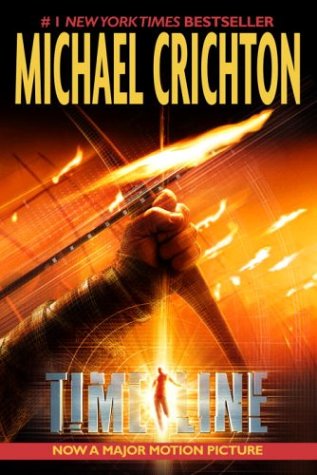All Nonfiction
- Bullying
- Books
- Academic
- Author Interviews
- Celebrity interviews
- College Articles
- College Essays
- Educator of the Year
- Heroes
- Interviews
- Memoir
- Personal Experience
- Sports
- Travel & Culture
All Opinions
- Bullying
- Current Events / Politics
- Discrimination
- Drugs / Alcohol / Smoking
- Entertainment / Celebrities
- Environment
- Love / Relationships
- Movies / Music / TV
- Pop Culture / Trends
- School / College
- Social Issues / Civics
- Spirituality / Religion
- Sports / Hobbies
All Hot Topics
- Bullying
- Community Service
- Environment
- Health
- Letters to the Editor
- Pride & Prejudice
- What Matters
- Back
Summer Guide
- Program Links
- Program Reviews
- Back
College Guide
- College Links
- College Reviews
- College Essays
- College Articles
- Back
Timeline MAG
In Timeline, Michael Crichtontransports the reader to 14th-century France and explores perils as a result ofventuring into a different time.
This book is as much about investigatingpre-Renaissance Europe as it is about the dangers associated with recklessexploitation of technology. The latter is elegantly exemplified by the CEO ofITC, Robert Doni-ger, a ruthless, clever physicist turned businessman who claimsITC's new technology can be applied to bring the study of history to newfoundheights. In reality, he has covert ambitions that have little to do with historyand even less to do with academic study.
Timeline is well laid outand proceeds according to Crichton's usual method: compel thereader to speculate about the direction of the story, and then diverge from theexpected. Constant foreshadowing, however, tends to ruin some of the surprisesand adds a level of predictability that may disappoint some (or please otherswhose predictions come true). Crichton attempts to base this novel on scientifictheory, but as it progresses, the plot turns into wild posturing, which isrequired to keep the plot flowing. Nevertheless, it is to be expected in anarrative whose main point is to warn of the dangers of unregulatedtechnology.
In that respect, the novel is a success. Doniger's chillingspeech at the conclusion is enough to constrict one's arteries, so powerful areits insinuations. The whole story builds to this final monologue in which thereader is directly alerted to the problems facing a society that offersscientific breakthroughs every day.
Aside from the moral and scientificaspects, the book is a superb adventure with all the twists and turns one expectsfrom Crichton. The plot is as thick as peanut butter and the parallel stories ofthe current world and 1357 add complexity and intrigue.
Timeline is athought-provoking message in novel form accompanied by all the tidings such aliterary style brings: adventure, romance, mystery, suspense, and an importantidea. Crichton cleverly weaves his warning about the dangers of technology intoan adventure that, while entrancing, clearly states the point.
Timelineis definitely worth exploring for both Crichton fans and readers looking forsuspense novels that incorporate modern scientific advancements and theories.
Similar Articles
JOIN THE DISCUSSION
This article has 1 comment.


0 articles 0 photos 12292 comments